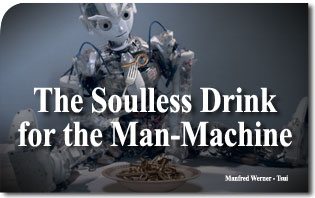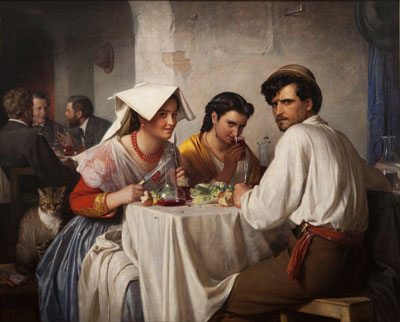 New Soylent Drink of Doubtful Nutritional Value,
New Soylent Drink of Doubtful Nutritional Value,
But it Certainly Leaves the Soul Empty
Ever think you’d see a fast-food place where people could ingest meals like a car gets filled with gas? Like a fast-food place on fast forward.
Well, we’re a step closer to the one-stop human feeding station. Today, there is a new shake supplement called Soylent that would supposedly eliminate the need to eat regular food.
In an article on his web site titled How I Stopped Eating Food, Rob Rhinehart, a 24-year-old software engineer from Atlanta, tells how and why he invented a one-drink-fits-all. He said he studied what nutrients the body absolutely needs, blended them into a tasteless, bland, beige-colored drink and did away with normal food for 30 days.
Motivation for Not Eating Food
His motivation?
“Not having to worry about food is fantastic. No groceries or dishes, no deciding what to eat, no endless conversations weighing the relative merits of gluten-free, keto, paleo, or vegan. Power and water bills are lower. I save hours a day and hundreds of dollars a month.
“The proportions in Soylent are loosely based off the recommendations of the FDA, though I added a couple extras and changed a few based on my testing. Here is what the body needs.”
For Rhinehart, eating is about efficiency and supplying what the body needs.
Really?
While there is an evident nutritional need attached to eating, there is more to food than nutrition. I’m no nutritional expert and won’t comment on Mr. Rhinehart’s Soylent drink from that perspective. But what about the cultural aspect of food?
Food as a Cultural Measuring Stick
The food we make and eat is an expression of our culture. In every society and epoch, food has been an infallible cultural measuring stick.
Unfortunately, over the decades, America has lost some aspects of culture to achieve ever greater production, efficiency and standardization. This is especially true in the area of cuisine. For example, 25% of Americans eat fast food every day, and 20% of all meals are eaten in a car. Our mass culture has produced a mass cuisine.

In his book Return to Order: From a Frenzied Economy to an Organic Christian Society–Where We’ve Been, How We Got Here, and Where We Need to Go, John Horvat II offers a solution to the mass culture. He points to an organic Christian society, where people are not looked upon as statistics, or as cogs in the giant wheel of a great machine to produce material things.
In an organic society, material production aims at not only supplying basic physical needs, but also to satisfy higher desires and spiritual appetites for beauty, excellence, or refinement.
Such higher desires correspond to man’s constant desire to discover ways to better his situation. Everyone needs to eat. Any food can fill our stomachs. Even Soylent can do this.
But we find a special joy when we are given delicious or well-presented food that suits our tastes. This delight corresponds to the higher spiritual element of production, which gives to the product those intangible things that please the soul and aid in the practice of virtue.
Generally speaking, there is a physical and spiritual dimension to any need, which varies in intensity from person to person. To the degree that both dimensions are satisfied, production accomplishes its purpose.
A meal prepared with proper care can be a platform and opportunity for better things like good conversation and bonding. A family-owned restaurant that serves a simple spaghetti and meatball dish on a crisp, clean tablecloth offers an experience that pleases the palate and the soul. This is even more so when the cook prepares a more refined dish, such as leg of lamb, with kale and mashed potatoes. If you add a glass of wine to it, the meal climbs to an even higher level.
In contrast, I highly doubt that soylent satisfies even our basic nutritional needs. It does however meet the practical needs of the man-machine to fill his stomach. It’s fast and cheap. But it leaves souls on empty.
Unique Life in an Organic Society
Organic Christian society is the exact opposite of the mass culture that produces a mass drink for the man-machine man such as Soylent. It is a society that comes about when each family, each region, each person seeks to develop their own uniqueness to perfection.
It is “organic” because this order does not treat people like parts in a machine but as living and unique beings with all the complex and nuanced elements that are part of unique life.
From the concept of organic, we can consider characteristics that spring from living things: spontaneity, vitality and creativity.
Return to Order presents and celebrates these characteristics as a refreshing contrast to mass culture, where the food, clothing and customs can be monotonous and vulgar.
